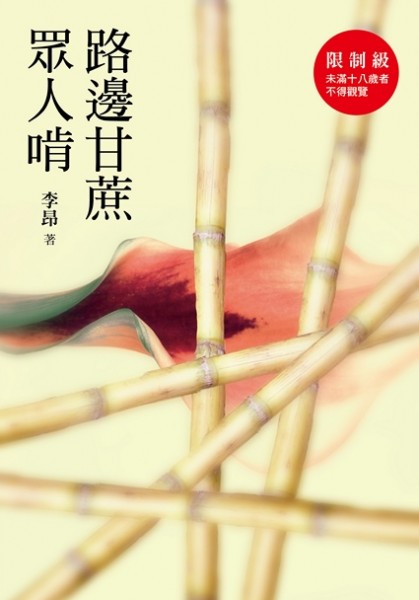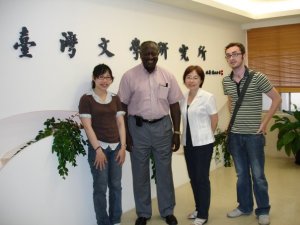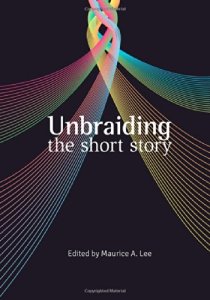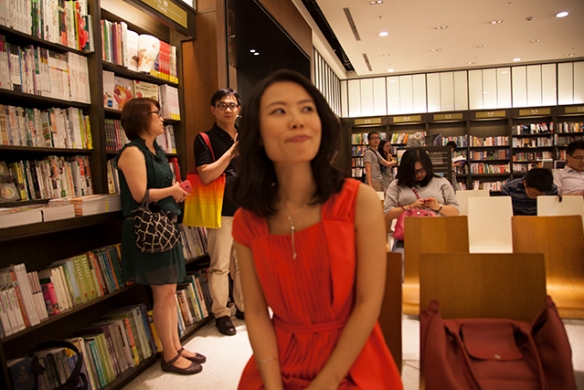Chiang Wei-shui is featured on this 10 yuan piece, the central bank issued it in 2010 in memory of him ( http://www.cbc.gov.tw/ct.asp?xItem=36863&ctNode=752&mp=2 ) read more about him here: http://en.wikipedia.org/wiki/Chiang_Wei-shui
Category Archives: Home
A Review of Li Ang’s ‘Everyone Chews on Sugarcane by the Side of the Road’ 李昂的《路邊甘蔗眾人啃》書評
Warning: there is adult content in this post.
This is Li Ang’s much anticipated follow up to her 1997 book Everybody sticks it in the Beigang Incense Burner (《北港香爐人人插》), which I’ve yet to read. At first glance it is an irreverent look at the misogynistic self-aggrandizement that characterizes the generation of democracy campaigners who rose to fame after being imprisoned in the martial law era in Taiwan, some of whom later formed the Democratic Progressive Party and went into government under former president Chen Shui-bian. The book also deals with the symptomatic nature of the way the February 28 incident and the White Terror continue to manifest themselves in the political arena. Although this might seem a rather obscure or outdated theme, it can give us an insight into the background of the political mindset in today’s Taiwan, particularly in light of the recent Sunflower Movement and the problems in governance that it has highlighted. The attempt to smear the participants of the Sunflower Movement in March and April as violent rioters, for example, is reminiscent of the Kuomintang’s rhetoric against democracy protesters during the 1980s and 1990s that features in the book.
The book centres around the life of Chen Junying (陳俊英) from his youth as a dissident during the Martial Law era, to his slow drift into irrelevance as a retired politician living in the US in his later years. Li Ang goes to great pains in the introduction, stating several times that the character isn’t based on any one person in particular – her protestations are so frequent however that it’s almost as if she’s prompting us to take this denial with a pinch of salt.
Chen feels owed by Taiwanese society and Taiwanese women in particular and he has a mantra that recurs throughout the book which rationalizes his misogynistic behavior:
(My translation) He was forever the one being let down, it wasn’t just the Taiwanese people who owed him, didn’t Taiwanese women owe him too‽ So it was natural for him to sleep with a good number of women when he came out of jail.
The book can be read as a satire up to a point and parts of it are quite funny, recalling the satirical bite of Wang Chen-ho’s Rose, Rose, I Love You /《玫瑰玫瑰我愛你》, like the protagonist’s assumption that he will ejaculate more than other men because of the years he spent in prison, and because he thinks so much of his own masculinity:
(My Translation) She discovered that Chen Junying was excessively liberal with toilet paper after making love. When he climaxed, he didn’t leave that much ejaculate in her (his sperm wasn’t particularly greater in volume than other men, nor did it smell fishier), and not much of it would drip out of her vagina after they’d finished, so one or two sheets of toilet paper would have been enough to absorb it all. He would grab a handful of tissue from the box, however, and pass her a pile, watching her as she meticulously wiped herself clean of any trace until all of the tissue was used up.
In the same vein, Chen takes a very chauvinistic attitude during sex, as, despite being reviled as a dissident by many women in his youth, he still finds time to grumble about the only girl who is willing to get together with him, and treats her with scorn, viewing her status as the product of a “mixed marriage” between a mainland soldier and an aborigine as below his – with a lot of his fellow dissidents using the phrase 「無魚蝦也好」 (bô hî, hê mā ho – If there’s no fish, you can make do with shrimp) to tease him
Continue readingAn alms bowl by any other name 盋/砵/缽/鉢 bō
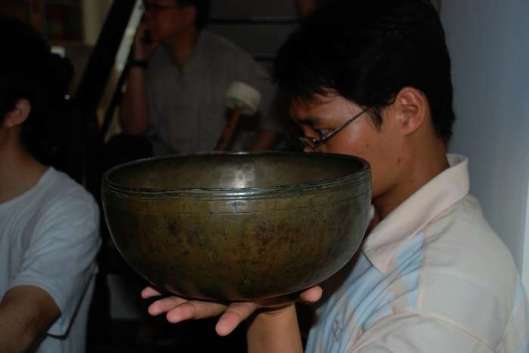 Ever seen buddhist monks on the street collecting money with an alms bowl? Did you notice what it was made of? It’s interesting when you come across variants in Chinese based on the difference between the materials used to make it.
Ever seen buddhist monks on the street collecting money with an alms bowl? Did you notice what it was made of? It’s interesting when you come across variants in Chinese based on the difference between the materials used to make it.
The Taiwanese Ministry of Education dictionary lists 缽 Bō as an alms bowl. I also found 缽 in 《馬橋詞典》:
他滋味無窮地搭嘴搭舌,突然想起什麼,轉身去他的窩邊取來一個瓦缽,向我展示裡面一條條黑色的東西。
I came across the character 盋 online and when I presented it to two Taiwanese colleagues, neither of them were able to identify it, however when I said it was pronounced Bō, one wrote 鉢 and the other wrote 缽.
盋 is a rare variant of Bō, made up of 犮 quǎn – itself a variant of 犬 (hound/dog) – and 皿 mǐn (dish/shallow container).
The other three characters all combine 本 běn, which seems to be a phonetic component, with three different materials 缶 fǒu (pottery), 石 shí (stone) and 金 jīn (metal): 缽 砵 鉢
If you know of any other variants that follow this pattern, hit the comments section and I’ll feature them in a future post.
Photo credit: 心道法師
Side by side or top and bottom? Varying it up with variants
 OK – just a quick post today! Am reading 《馬橋詞典》(Dictionary of Maqiao) by 韓少功 (Han Shaogong) at the minute and came across a word for a woman’s period or menstruation – 例假 – that I hadn’t seen before. For some reason I read this as 例期 however and looking it up I found the variant 朞 – a bottom top variant of 期 – combining 其 and 月. This reminded me of a few other variants that follow this pattern, like 峰 and 峯 feng1 “summit,” and 群 and 羣 for “qun1” crowd.
OK – just a quick post today! Am reading 《馬橋詞典》(Dictionary of Maqiao) by 韓少功 (Han Shaogong) at the minute and came across a word for a woman’s period or menstruation – 例假 – that I hadn’t seen before. For some reason I read this as 例期 however and looking it up I found the variant 朞 – a bottom top variant of 期 – combining 其 and 月. This reminded me of a few other variants that follow this pattern, like 峰 and 峯 feng1 “summit,” and 群 and 羣 for “qun1” crowd.
There’s also 鑒 and 鑑 jian4 which have their ingredients stirred around a little.
Let me know if you know of any others!
Battlefield Report: One of the More Amusing Campaign Leaflets
 One of the more amusing campaign leaflets from this guy Kang Mingdao who obviously has expert Photoshop skills.
One of the more amusing campaign leaflets from this guy Kang Mingdao who obviously has expert Photoshop skills.
It says “Battlefield report” on the left.
On the right, under the heading: “Taiwan’s number one gang, the party of dragons, tigers and leopards” is a picture of Jiang Yi-huah, Ma Ying-jeou and King Put-sung (I originally thought it was Hau Lung-pin, thanks for the correction Les) in their Sunday best. The stamp on the right in red is the title of a Hong Kong film Born to be King (《勝者焉王》)although the title is more akin to “History makes the victor a King, and the loser a scoundrel”), the successor to the Young and Dangerous movies (《古惑仔》), based on the Teddyboy manga series by Cantonese manga artist Ngau Lo (牛佬) – which are said to have formed the main stereotypes about the triads. To the right in the vertical text it says, “The three bandits challenge the 23 million Taiwanese people.”
Below it says:
-[They] allowed dodgy edible oil manufacturer Ting Hsin to pose a risk to precious Taiwanese lives by poisoning them.
-In six years, they undermined the stability of Taiwan’s political scene.
-They ask young people to marry and have kids, despite the paltry NT$22,000 a month salary.
-Let’s not let them leave Taiwan when their term in office is over.
This is not an endorsement.
Don’t try to be clever, son! Lí mài teh ké-gâu! 你 mài teh 假 gâu!
Feel like your friend’s being a pretentious ass and want to take him down a peg or two? This is the phrase for you!

Ké-gâu 假![]() – translated into 自作聰明 or “trying to be clever, thinking you’re clever” (when you’re not).
– translated into 自作聰明 or “trying to be clever, thinking you’re clever” (when you’re not).
Lí mài teh ké-gâu! 你 mài teh 假gâu!
It can be adapted into Mandarin too, so you can say:
你不要在那邊ké-gâu! Stop trying to be clever!
One example would be a recent ad I heard on the radio the other day, which used a quote from Nietzsche’s Thus Spake Zarathustra, specifically about the Übermensch to advertise apartments in Hongshulin.
Feel free to contact me with any cool Taiwanese words or phrases you hear and want featured on the blog.
‘The Face Changer’ by Wu I-Wei in Unbraiding the short story
When I was still a student at the Graduate Institute of Taiwan Literature, an American professor came to visit one of my professors and, as one of the two resident foreigners in the department, I was enlisted to see what it was he wanted over dinner. The professor was Maurice A. Lee (see picture second left) and he was hoping to organize a conference in Taiwan, unfortunately our research institute didn’t have the funds to make it happen, but we had a nice chat.
Some years later, Taiwanese author Wu I-Wei (吳億偉) asked me to translate a short story for him called ‘The Face Changer’ (〈換照者〉), which it turns out has been published in a new anthology edited by Maurice A. Lee called Unbraiding the Short Story, which includes short stories from all around the world. Looks like an interesting read, here’s a quick sample of Wu’s story:
The face changer had been born without a face. His mother said that he’d wanted it that way. Back when he was in his mother’s womb, she was unable to make him whole, and he had to face the world lacking. The only favor his mother granted him was helping him decide which part of his body to go without. Floating in his mother’s amniotic fluids like a corpse, he saw his arms, his two feet, and his body, he felt reluctant to part with the bits he’d already seen, but that only left his face, the only thing he couldn’t see, after his tacit response to his mother’s question, he cried out, and then came into the world.
He scared the doctors and nurses in the room when he was born, each of them guessing as to what the child would look like when he grew up. This would be the reason that he would later change his face so much, but it wasn’t because he wanted to shock everyone, with a face that could never be pinned down, but rather that he wanted all their guesses to come true, to satisfy all of their imaginings. Before his face-changing days, back when he was young, he faced a lot of challenges. His mother was worried that he’d scare people, so she drew a face for him. Lacking in imagination as she was, however, the eyes, nose and mouth she drew were those from your average picture book, his features all curved in shape, with eyes like rainbows, and a mouth like an upturned rainbow. If his mother had remembered, she would have drawn a little dot for his nose too.
What a splendid face she had drawn him, it always looked so happy that whenever his teacher saw him, she would pinch his cheeks, asking him why he smiled all day long. He couldn’t open his mouth to say anything, so he could only smile in response. As his expression was dictated beforehand, he became the nice guy in his class, and gave the impression of having a particularly good temper. If people hit or cursed at him, he’d still smile away. Sometimes a teacher would intervene, then seeing that the look on his face hadn’t changed a fraction, they would say how innocent he seemed, like an angel…
換照者一生下來就沒有臉。他母親說這是他自己要求的,早在娘胎的時候他母親便無力給他一個完整的身體,他得缺陷的面對這個世界,他母親唯一能幫忙的,就是讓他決定要缺少哪個部份,像個浮屍般漂在母親羊水中的他,看到自己的雙手,看到自己的雙腳,看到自己的身體,這些看得到的他都不想放手,只剩下臉了,他唯一看不到的東西,悄悄回答母親的問題後,哇的一聲,就見到這個世界了。
據說剛出生的時候他嚇到在場的醫生護士,大家紛紛猜測這小孩長大之後會長怎樣,這可以說是他日後之所以換照的遠因,但絕對不是因為他想要跌破大家眼鏡,擁有一張他們猜不到的臉,而是他要大家的猜測紛紛成真,滿足每一個人的想像。在這之前他年幼當然也受到了一些挑戰,他母親怕他嚇到大家,幫他畫上了一張臉,只能怪他母親想像力貧瘠,他的眼睛鼻子嘴巴就是那種在一般畫冊中看到的,臉上五官都由弧線所構成,眼睛像彩虹,而嘴巴則是反過來的彩虹,若是他母親記得的話,會在彩虹的中間補上一點,那是鼻子。多麼燦爛的臉啊,看起來永遠那麼快樂,學校老師看到他,總喜歡捏捏他的臉,摸摸他的眼睛,嘴巴,你怎麼一天到晚都在笑,他沒有辦法張口說話,只能微笑以對。由於他的表情使然,成為班上有名的好好先生,沒有脾氣,不管別人怎麼罵他打他,還是笑容滿溢,老師幾次幫他解圍,看到他表情沒有一絲一毫的改變,直呼他真是天真,如天使般……
Wu has won numerous awards including the United Daily Press Literary Award for Fiction, the China Times Literary Award for Fiction and Essays, the United Literature Monthly Literary Award for Fiction, and the Liberty Times Lin Rungsan Literary Award for Short Essays. He published his new collection of essays, Motorbike Days (《機車生活》), in 2014 and is now a PhD candidate at the Institute of Chinese Studies at the University of Heidelberg in Germany and regularly reports the latest German literature news for Taiwanese magazines and newspapers.
Still working on reviews, not given up on the blog, expect more content soon.
Taiwanese word of the day: to fall off your motorbike (but forget to let go of the handles) 犁田 (雷殘) lê-chhân

I was discussing Taiwanese expressions that are quite hard to translate today with my coworkers over lunch, and one word they mentioned really stayed with me because it evokes a very comic picture in your mind. The phrase is 「犁田」lê-chhân and is often rendered phonetically into Mandarin as 「雷殘」. It’s original meaning is to plough fields, but it has been extended to mean when people fall off the back of their motorbikes but keep holding on to the handles so that they get dragged behind, like a man driving a plough, although it can be applied to falling off your bike or motorbike in general. It is a jokey term, so only really appropriate for minor scrapes. It is another of these Taiwanese terms that you can use in Mandarin, the equivalent (but without the comic image) is 「摔車」. Drive safe people!
The Ministry of Education’s Taiwanese dictionary provides this example:
伊昨暗車騎無好勢,都犁田矣。I cha-àm chhia khiâ bô hó-sè, tō lê-chhân—ah. (他昨晚車子沒騎好,就摔車了) Last night he wasn’t driving carefully, and fell off his bike.
Feel free to contact me with any cool Taiwanese words or phrases you hear and want featured on the blog.
Book launch: The woman from Taichung meets the little French prince《臺中一姊遇到法國小王子》
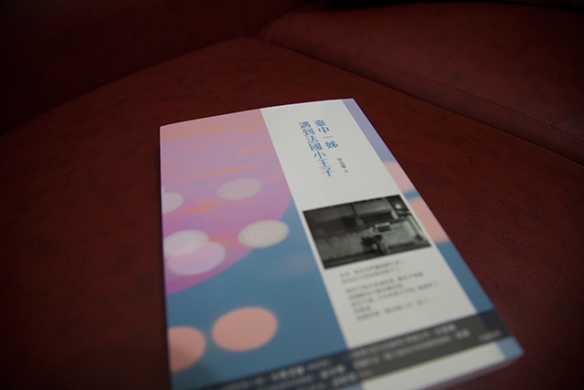 Went to an enjoyable book launch today. The book is called 《臺中一姊遇到法國小王子》(The woman from Taichung meets the little French prince). I read the first few chapters when I was waiting to meet the author. The book seems like a charming, light read, on the development of the romance of the author and her French boyfriend (now husband). If you’re asking “why do I care?” right now, the answer is perhaps that Taiwan is still very conservative about what it calls “cross-cultural” relationships, and this book has an important task in offering an alternative representation of foreign male/Taiwanese female relationships to the one that Apple Daily most revels in, ie a nasty foreign guy who is unemployable in his own country, comes to Taiwan, and uses a combination of drink and foreign tricks to sleep with her, robbing Taiwanese men of their birthright (I think Li Ang’s book is having an effect on me). The couple are very charming, and the vocabulary is definitely very accessible for foreign learners looking to pick up their first Chinese-language novel. Of what I gleaned of the tone of the book, it’s not about foreigner worship, or doing down Taiwan, but is rather a comic but sincere look at how relationships like these function long term, which is what Professor Fongming Yang was asking for in this article.
Went to an enjoyable book launch today. The book is called 《臺中一姊遇到法國小王子》(The woman from Taichung meets the little French prince). I read the first few chapters when I was waiting to meet the author. The book seems like a charming, light read, on the development of the romance of the author and her French boyfriend (now husband). If you’re asking “why do I care?” right now, the answer is perhaps that Taiwan is still very conservative about what it calls “cross-cultural” relationships, and this book has an important task in offering an alternative representation of foreign male/Taiwanese female relationships to the one that Apple Daily most revels in, ie a nasty foreign guy who is unemployable in his own country, comes to Taiwan, and uses a combination of drink and foreign tricks to sleep with her, robbing Taiwanese men of their birthright (I think Li Ang’s book is having an effect on me). The couple are very charming, and the vocabulary is definitely very accessible for foreign learners looking to pick up their first Chinese-language novel. Of what I gleaned of the tone of the book, it’s not about foreigner worship, or doing down Taiwan, but is rather a comic but sincere look at how relationships like these function long term, which is what Professor Fongming Yang was asking for in this article.
Thanks to my skills with the camera, most of the footage is a little fuzzy along with the pictures, but had an interesting chat with the author (above), and will write a review after I’ve read it, incorporating some of the footage I shot.
Taiwanese word of the day: Fail to hit the mark/to muck up 脫箠(凸垂) thut-chhôe
脫箠(凸垂) thut-chhôe to make a mistake, to muck up; Mando: 出差錯

One of my friends used this word in a message he sent me today. The message read as follows:
在工作…客人要來工廠我很忙>_<
我怕我講英文惠[sic. should be 會]凸垂
緊張!!!!I’m working… a client is coming to see the factory [so] I’m really busy>_<
I’m worried I’ll make a mistake with my English
Nervous!!!!


